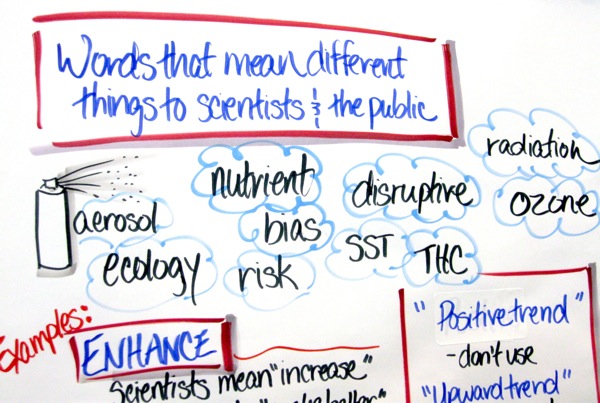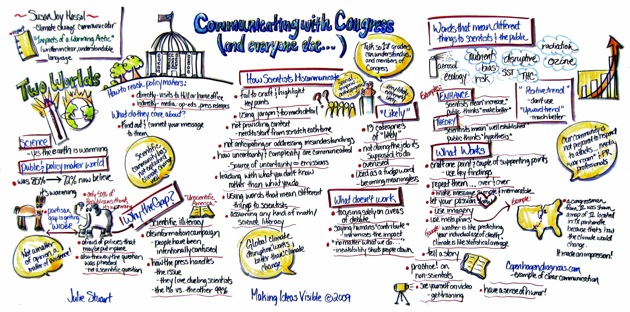Ask NASA Climate | January 9, 2010, 16:00 PST
Word games
Same words but different meanings
From Adam Voiland, NASA Earth Science News Team

One of the posters — called Communicating with Congress (and Everybody Else) — brainstorms some of the pitfalls that make communicating climate science such a challenge. High on the list: jargon. Scientists use such a specialized language that it can be difficult for non-scientists to distill the meaning from certain scientific presentations or articles. Complicating matters more, there are some words that have distinctly different meanings to scientists and to the public. The poster highlighted a handful of them. I've taken the liberty of elaborating upon and defining a few of them below.
Did you know the difference? Have any good examples to add to the list?
- The Public: Spray cans that dispense a liquid mist, many of which damage Earth's ozone layer.
- Scientists: A suspension of any solid or liquid droplet in the atmosphere. Includes dust, soot, pollen, sea salt, sulfates and more.
Radiation
- The Public: Harmful material that leaks from nuclear material and is used to battle cancer.
- Scientists: Energy that comes from a source and travels through some material or space. Includes electromagnetic radiation such as radio waves, infrared light, visible light, ultraviolet light and X-rays.
- The Public: Something in our atmosphere that protects against cancer-causing light waves.
- Scientists: A molecule containing three oxygen atoms that, in different parts of the atmosphere, acts as a harmful air pollutant, a heat-trapping greenhouse gas, and a buffer against ultraviolet radiation.
Error
- The Public: A mistake, an accidental wrong action or a false statement not made deliberately.
- Scientists: Not a mistake; instead the difference between a computed, estimated or measured value and the true, or theoretically correct, value.
Bias
- The Public: Willful manipulation of facts to suit a particular ideology or point of view.
- Scientists: A term used to describe a statistical sample in which members of the sample are not equally likely to be chosen. Also a term used to describe the difference between an estimator's expectation and the true value of the parameter being estimated. For some scientific analyses, a certain degree of bias can actually be beneficial.

Cross posted and adapted from NASA’s What on Earth blog. Adam is based at NASA’s Goddard Space Flight Center outside Washington, D.C.
